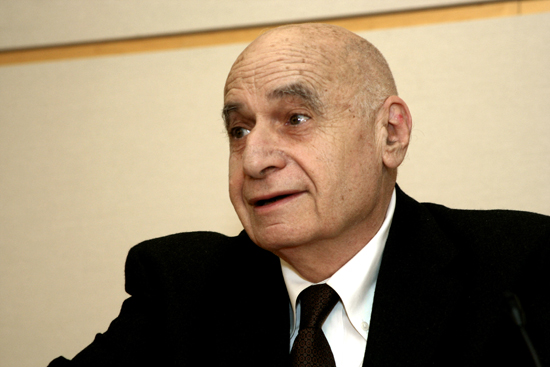Peter Berger and the Making of a Sociologist
A storyteller tells his own story

We could introduce Peter Berger’s new memoir with its story about his youthful theft of an acquaintance’s letter to her boyfriend while sitting in the john at the woman’s apartment. Or the tale he recounts about his famous friend, the late Catholic priest Richard Neuhaus, startling Berger during a joint African jaunt with news that his testicles were enlarged (a temporary side effect of a pretrip inoculation).
But as the 82-year-old Berger is one of the world’s foremost sociologists, we’ll share the story of how that career happened, announced by the book’s title, Adventures of an Accidental Sociologist: How to Explain the World Without Becoming a Bore (Prometheus, 2011). As a 20-something Viennese immigrant to New York, he planned a career as a conservative Lutheran minister. Thinking that taking a night class on Balzac as a Sociologist would teach him about the American flocks he aspired to minister, he writes, he learned nothing about America, but caught the bug of sociology—“an endless curiosity about every aspect of human behavior.”
Berger, a College of Arts & Sciences professor emeritus and former, and founding, director of BU’s Institute on Culture, Religion, and World Affairs (CURA), has been at the University since 1981. Known for his studies of religion, he cheerfully confesses that he and colleagues failed to foresee a key revelation: that modernity leads most nations not to secularization, but rather to pluralism; religions have multiplied, not vanished, from America to Africa. He remains a senior research fellow at CURA. BU Today spoke with him about his book, his career—and about why he hates PowerPoint.
BU Today: You write that sociology has “moved in directions that are uncongenial to me.” How so?
Berger: One I call methodological fetishism, which means that you only study things that can be quantified. Quantification is sometimes useful. But things that are more complex are very hard to put in a survey. Some sociologists have decided that Japan is a very secular country. If you know anything about Japan, that’s crazy. It’s full of religious movements. The questionnaires that are used are based on western bias; if you ask a Buddhist, “Do you believe in God?” that’s a meaningless question. So you get sociologists saying, “They don’t believe in God; that means they’re atheists.”
The other one is that sociology for many has become an ideological instrument, mostly advocating various countercultural or left-of-center causes. If a science becomes simply advocacy, it ceases to be a science.
You call yourself “theologically quite liberal.” Could you define that?
One takes an analytic and somewhat skeptical position in terms of religious tradition. In Christianity, the opposite of a liberal approach to scripture would be an evangelical one, which takes scripture as the inspired word of God, more or less as it is written. [Personal theology] should be separated from what one does as a sociologist, which should be an objective study of religion.
What moved you from your youthful orthodoxy?
One, getting older. When you’re young, you tend to take radical positions on anything. The other thing was becoming accustomed to America. America has a very common immigrant experience, a mellowing effect. It’s a pluralistic society, and I began to absorb that.
Pluralism is a good thing, because freedom is an important value. I think the United States is a peculiar country, because it is more religious than any other western society, the most vital aspect being the large and growing evangelical community. On the other hand, there is a cultural elite, which is quite secularized.
The most religious country is India. You take three steps in India and you stumble over five gods. The most secular country is Sweden. I wrote that America is a country of Indians with a Swedish elite, and many culture war issues have to do with the Indians becoming increasingly pissed off at the Swedes.
Do you ever wonder what your life would have been like had you stuck with your intention of becoming a minister?
Having strong intellectual interests, I probably would have drifted into teaching, maybe in a Lutheran school. I guess I would have buried people and married them.
What are you working on now?
Two projects. One, I’m interested in situations where secular elites have to cope with religious electorates. The project will deal with Turkey, Israel, India, and the United States. The other one deals with the increasing difference between Christianity in developing countries and in North America and Europe. In the global south, you have a robust supernaturalism. The world is full of spirits, miracles, exorcism, spiritual healing. I had lunch with Bob Hill, the dean of Marsh Chapel. He was interested in the project and said, “What do you want to come out of it?” I said, “I want you to explain to some African Christians why Marsh Chapel doesn’t have services to raise people from the dead.”
In your book you describe PowerPoint as “odious.” Why?
I don’t like technological aids to my teaching. If I can’t tell a story and capture the attention of my audience, I shouldn’t tell the story. I don’t condemn people who want all this technology, but I’d rather not.
Rich Barlow can be reached at barlowr@bu.edu.

Comments & Discussion
Boston University moderates comments to facilitate an informed, substantive, civil conversation. Abusive, profane, self-promotional, misleading, incoherent or off-topic comments will be rejected. Moderators are staffed during regular business hours (EST) and can only accept comments written in English. Statistics or facts must include a citation or a link to the citation.